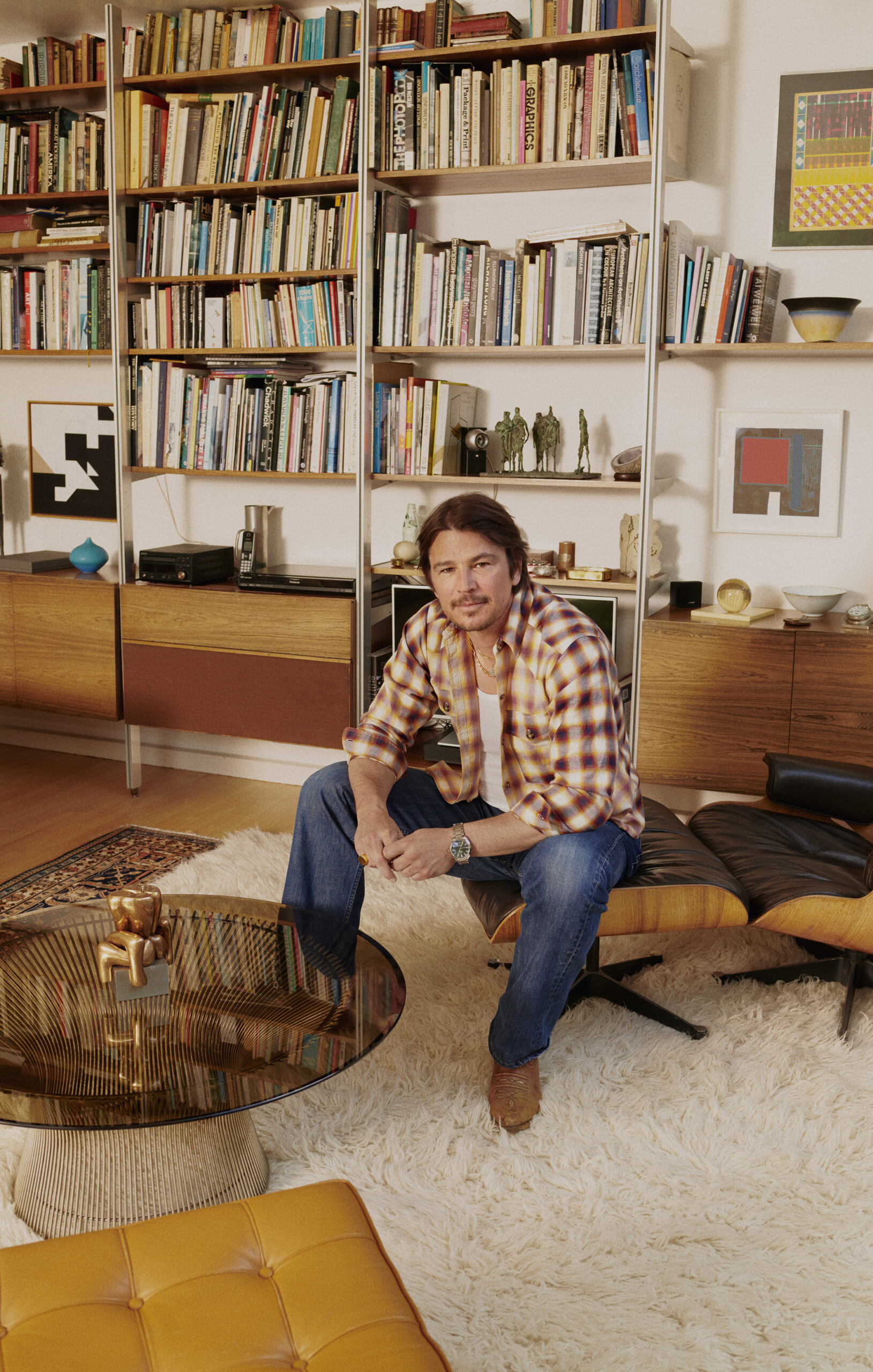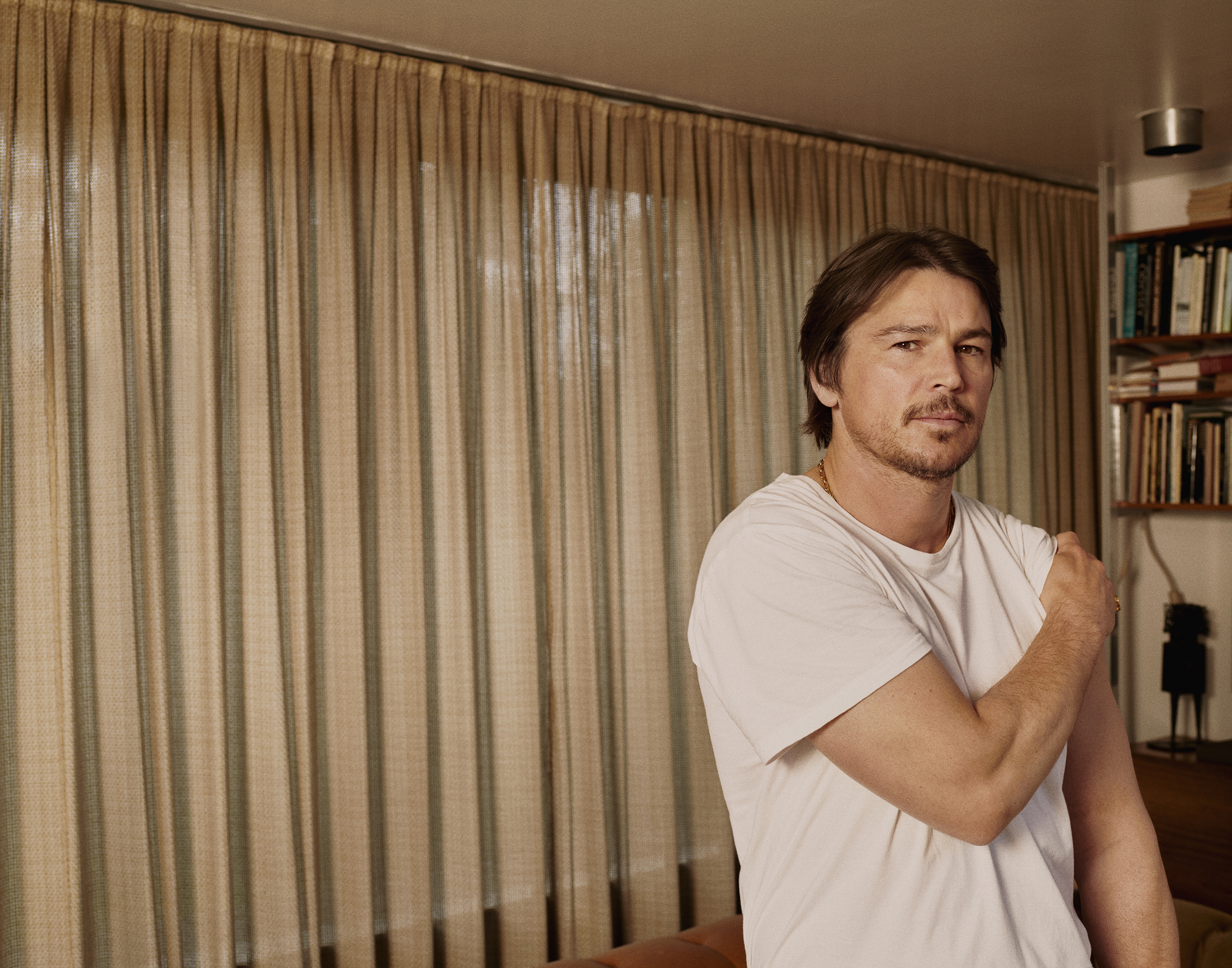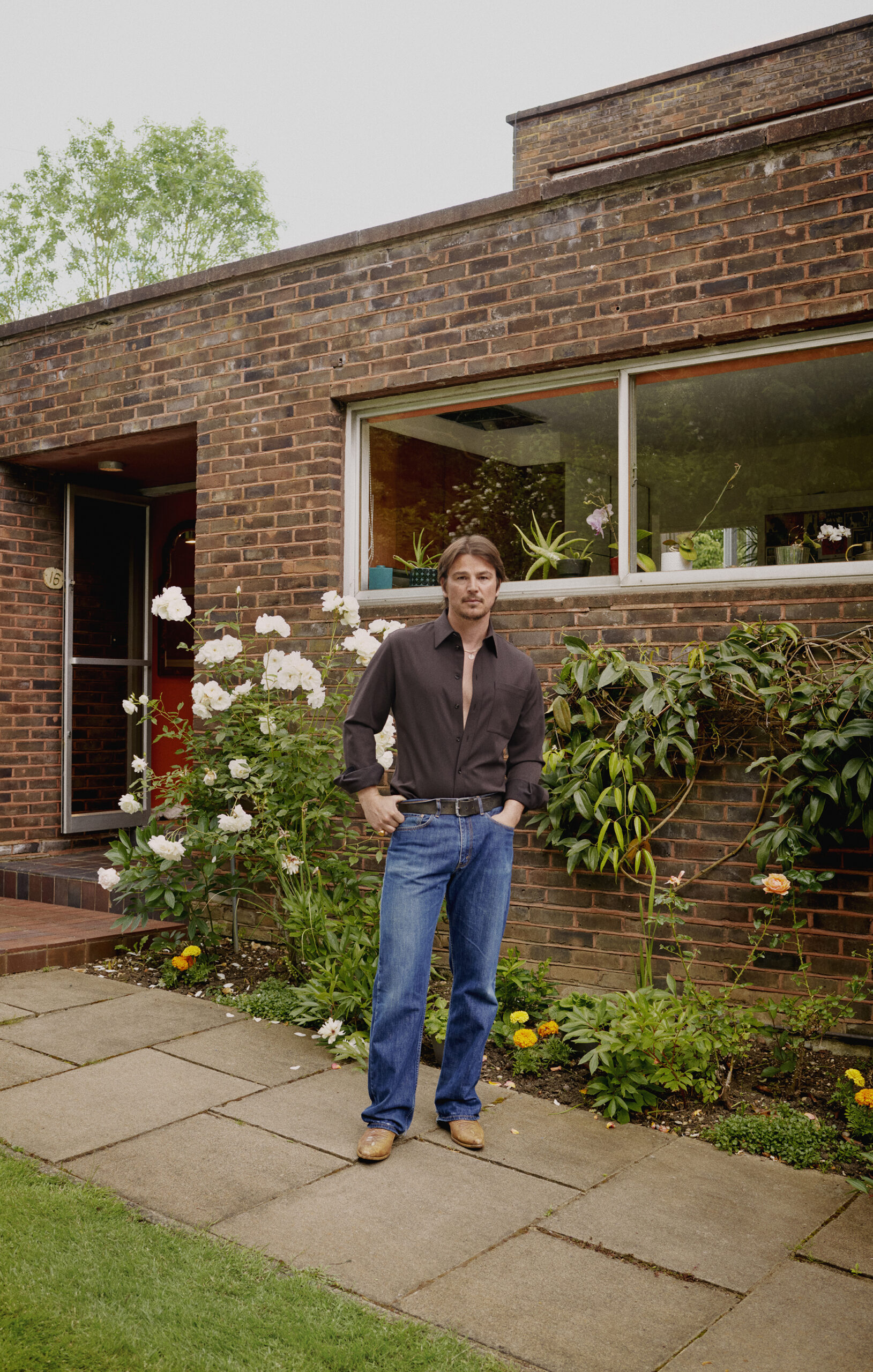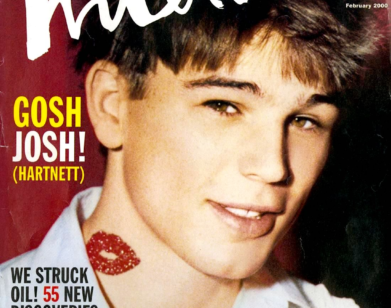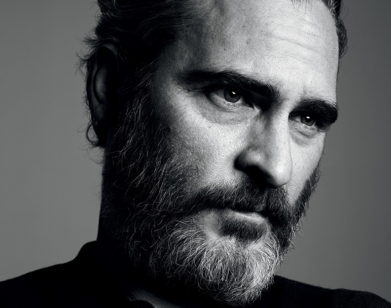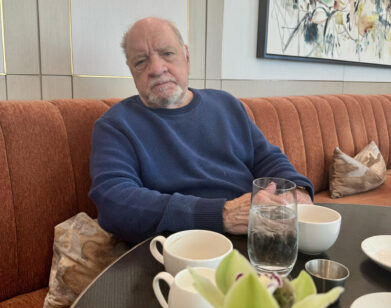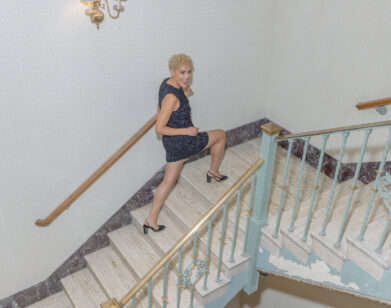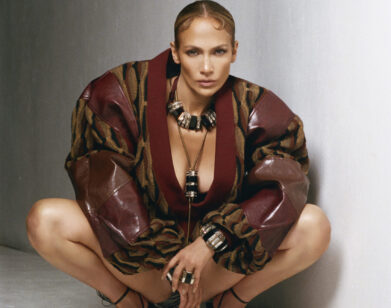DAD
Josh Hartnett Tells Julia Stiles How He Escaped the Hollywood Trap

Josh Hartnett wears Shirt and Jeans Stylist’s Own. Gold Chain Necklace (worn throughout) Cartier. Watch (worn throughout) Omega. Vintage Belt The Contemporary Wardrobe.
A bunch of years ago, Josh Hartnett did what any former teen heartthrob burnt out by the Hollywood spotlight would do: He moved to England, started a family, and got some goats. Hartnett never stopped acting, but recently the 46-year-old has worked his way back to the kinds of big-ticket projects that made him a star in the first place, including a surprise appearance in last year’s Oppenheimer. The Hartnettaissance continues with Trap, the latest M. Night Shyamalan thriller that centers around a serial killer taking his daughter to a pop concert, only to realize it’s a setup to capture him. To mark the occasion, we reunited Hartnett with his O costar Julia Stiles, who quickly found out they had a lot of catching up to do.
———
MONDAY 7 PM JUNE 25, 2024 LONDON
JOSH HARTNETT: Hey, Julia!
JULIA STILES: Oh my god! Hello!
HARTNETT: Good to see you. It’s been a long time.
STILES: So crazy. Has it been 24 years?
HARTNETT: Something like that. Thank you for changing this from yesterday. We had something with the kids, and if you listen you can probably hear them screaming because they don’t want to go to bed, because it’s a beautiful summer day and we rarely get these over here.
STILES: The sun’s up later in the day, so they never want to go to sleep.
HARTNETT: Exactly. And you have three kids now?
STILES: I do. You have four?
HARTNETT: I have four kids.
STILES: It’s totally amazing, but all the cliches are true that you’re outnumbered and it feels mathematically impossible sometimes. Then you have four, which is mentally another realm.
HARTNETT: It feels like we’re back in the ’80s. They’re their own little tribe and we just try to maintain the edges so they don’t go too far in any direction. It’s more like herding children now, as opposed to raising them.
STILES: How old is your eldest?
HARTNETT: Eight.
STILES: And you have a baby baby?
HARTNETT: Yeah. Sorry, I’m sweating bullets—it’s actually hot in England for the first time in a long time. I thought it’d be good out here in the conservatory, but I’m going to open a door real quick.
STILES: Did you say “conservatory”?
HARTNETT: [Laughs] I’ve been living with an English girl for 13 years. I speak it fluently now.
STILES: You speak the Queen’s English.
HARTNETT: [Laughs] I’m constantly having to translate from American English.
STILES: Do you get self-conscious living in England when you use words like “awesome”? American words that mean nothing.
HARTNETT: It doesn’t bother me. I actually think I’ve become more American since being here. But I do get really self-conscious about speaking to people in America, and they think I’ve turned—
STILES: Pretentious?
HARTNETT: You know what I’m talking about.
STILES: Yeah. You don’t sound pretentious at all. It sounds like you’re living your dream. I got nostalgic thinking about, “Whoa, what was happening 20-plus years ago when we made O together?” And I sort of remember that you and I were very similar when we were making that film—and you can correct me if I’m wrong, but everybody in that cast was at a time in their career when we were starting to become more recognizable and fame was something that was entering our lives. You and I both had attention that we didn’t know how to navigate. From what I’ve read about you since then, you left L.A. When was that?
HARTNETT: Well, I never really lived in L.A. Even when we were making O, I was in Minnesota, New York, nowhere, because I was living from set to set. I drove my car down from Minnesota to shoot O and then drove back after that. But the choice to step back from the industry had more to do with just plain sanity. In the late ’90s and early 2000s, as you remember, if you were named as one of these interesting people in celebrity culture, it was then the press’s mission to tear you apart. On top of that, I felt like the celebrity culture was really vacuous. I wasn’t going to be on Cribs, you know? I wasn’t going to be doing Punk’d. I wasn’t interested in any of that. I wanted to be myself amongst people that I knew, so I was able to revert back to my family and friends in Minnesota. Also, after a certain amount of time chasing a goal, I realized that achieving these things wasn’t giving me back the satisfaction I hoped it would, so I had to find something else to fill that gap. I felt, and still feel, that community is what fills it. Achievement is great in any walk of life. It’s a reason to get up in the morning. But the thing that really holds you is your community. I felt that I was kind of rootless at that time, so I wanted to find that community.
STILES: What drew you back into performing?
HARTNETT: I never stopped acting. I was doing films that were, in my opinion, worthy, but really small. A lot of first-time filmmakers, people that inspired me. I was really enamored with Tim [Blake Nelson] when we made O. It was his second film and, as you remember, the amount that he had riding on that production heightened the atmosphere. I love working with filmmakers who have it all on the line, because their first may be their last. I was spoiled at an early age in this business, in that the first few independent films I made were successful, so I thought that would maybe always be the case, and it wasn’t. But coming back to making studio films, what happened in all transparency was that we had a couple of kids, so I wanted to establish something that was a little bit more solid. Our business is very kind to you when you’re making big hits, but it can be difficult when you’re not. I realized I had to actually make a job out of this again, as opposed to it being some sort of hobby that I was chasing for years. And I got lucky that a few directors who I knew wanted to work with me. Then it started to snowball, and I’ve been able to work within the studio system again, which is extremely lucky because it doesn’t always work out that way.
STILES: Walk me through when you thought you were going to do Trap. Was it something that you were pursuing, or did you get a phone call, like, “M. Night Shyamalan wants to work with you”?
HARTNETT: Night and I met at The Village premier in New York a hundred years ago. I knew some people who were in it, and somehow I was invited to this dinner afterward. We started talking and got along really well. So when this came up, we got on a Zoom and took a little stroll down memory lane, started talking about the character, and got along really well. He was coming out to Dublin to produce his daughter’s movie The Watchers, so I flew over and we had another discussion. Then it was the strike, so we couldn’t do anything, but because Night finances his own films, we were able to get a special dispensation and got to start shooting in late October.
STILES: Did you enjoy working on it? I mean, every question that I’m asking you, I’m like, “That’s annoying.” I saw you chuckle when I was like, “So you took a step back from Hollywood”—I’ve had people ask me that question, and I laughed too, because I’m like, “Well, no, I did keep working. It was just independent films that nobody saw.” So forgive me for all of these questions that might be annoying, but I’m catching up from 20 years of the lack of Josh Hartnett.
HARTNETT: [Laughs] Don’t worry, ask away.
STILES: I’m jumping all over the place. How did you and Tamsin [Egerton, Hartnett’s wife] meet? Because I love these stories.
HARTNETT: The most Hollywood way imaginable. We played husband and wife in the worst movie either of us have ever made. No offense to the director, it’ll remain nameless. It just got lost in post-production. We were shooting here in London and both had significant others, and both realized that wasn’t going to work because we really liked each other. So I broke up with my girlfriend, she broke up with her boyfriend, and then after we stopped filming, we started to date. But I was living in New York and she was living in London, so we went on a few vacations together. Then she came out to the States and we went on a long road trip where she met my parents and it kept going. And then she kept staying with me and I kept staying with her. We were living a lot of the time between houses together, and then she got pregnant and then we got married.
STILES: Nice.
HARTNETT: How did you meet your husband?
STILES: We met on a set. He was a camera assistant. It was a little indie movie in the snowy mountains in Canada. I was not in a relationship at the time, but the movie ended and he lived in Canada, I lived in New York, and we would go back and forth taking turns, and that went on for a while. Then we were like, somebody’s got to move in with the other person, which country are we going to live in? And it naturally progressed from there. We were engaged, I got pregnant, and then we got married.
HARTNETT: We were engaged when she got pregnant.
STILES: Do your kids come to set with you?
HARTNETT: Sometimes, but they’re in school and we’re in the middle of nowhere, so they’ve got a nice outdoorsy life. We’re not that far from London, so we’ve still got all that available to us. I try to come back more, is what I’m trying to say. So I’ll go to shoot for hopefully only two, three weeks at a time, and then I’ll come back and see them. But they came out for Trap. It’s tough with school. You don’t want them to feel like they’re missing things with their friends.
STILES: Mm-hmm. I bet you can’t answer this, but do you play a bad guy in Trap?
HARTNETT: It’s fairly well documented already, so I think I can say yeah, he’s not a good guy.
STILES: Is he a sociopath?
HARTNETT: Yes. What Night wants to do, and I really appreciate this about him, is that he’ll take any genre and try to come at it from a different angle. In this instance, he’s like, “I want to make a thriller, but one where the person we’re siding with would be the natural antagonist.” That’s the challenge of the piece.
STILES: So when you’re playing a character like that, do you approach it like he thinks he’s the good guy?
HARTNETT: Good doesn’t really enter into it. It’s about what a sociopath sees as a natural thing to do, and that’s not necessarily something that lines up with any sort of morality system writ large. In his own mind, he feels like he’s being honest, and that’s good enough.
STILES: Wow. Do you take that kind of work home with you?
HARTNETT: [Laughs] Not this one, no.
STILES: [Laughs] I don’t mean sociopathic behavior, but when you’re working on a drama or a comedy, for example, there’s a certain energy that you have to maintain all day. So energetically, do you take that home with you?
HARTNETT: By the end of this, I was drained. It was pretty dark. Even the fun stuff, because it is a funny movie, was rooted in a darker psychology. So yeah, going to that place every day does affect you. But when you have kids, you don’t have the luxury of bringing it home too much because they demand certain things and you have to let it go. I’ve had a lot of people ask me about method acting recently. And I was like, “I think it’s fiction.” I think method acting is a joke that some actor came up with.
STILES: To make them feel like they were putting in the work. I’m so glad that you said that.
HARTNETT: Yeah. To make the whole set focus on and be afraid of them so that they’re the one that really matters in the room.
STILES: But yeah, there is something about kids that keeps you moving forward. You come home and you just have to change the subject, which is healthy actually, and probably more creative.
HARTNETT: Absolutely. For anybody in any job, it’s good to be able to fully invest in the work you’re doing and then come home and have somebody pull you out of it. Otherwise, that’s not really a life.
STILES: What do you do on set with all the downtime? Do you have a hobby? I remember during O you had a really nice manual-focus camera.
HARTNETT: Yeah, it was either that or a Rolleiflex. I used to take a lot of photos, and then when everybody got an iPhone and they could do any sort of filter and make their pictures look great, I got discouraged and stopped making my own. But I’m doing it a bit now because my daughter’s really into it.
STILES: You know how much time there is in-between setups. What do you do to pass the time?
HARTNETT: On this one, I didn’t have any free time because I was in everything. And Night wanted me with him the whole time. But the other thing is, with kids, especially if I’m working in the States and they’re going to bed at lunchtime, I’m talking to them a lot on FaceTime. Having four kids and working so much has been really eye opening. I don’t recognize what I must have been going through as a younger person. The amount of time I had to do all sorts of stuff that I was interested in was insane. I don’t know why I didn’t become an architect. I could’ve had 50 degrees.
STILES: Yeah. I was asking because I could never figure out what to do on set. Like, reading would make me sleepy, so I actually stopped hiding. Instead I would hang out on set just to watch what everyone’s doing and chat.
HARTNETT: You were hiding a little bit.
STILES: I think I hid all the way through my twenties and thirties.
HARTNETT: Really?
STILES: I was deceptively shy.
HARTNETT: Yeah. I was always obsessed with the filmmaking culture; I was always kind of there. I’m a little bit less enamored by everything now.
STILES: But the microcosm that everybody creates on a film set is magical. It’s crazy how these mini civilizations form in the span of a couple months or less.
HARTNETT: It’s the circus.
STILES: Yeah. So, have you gotten into British football?
HARTNETT: A little. But I’ve decided that I can’t carpetbag a team, so I’m not like every other American I know who has a club that they care about.
STILES: Do your kids have British accents?
HARTNETT: A hundred percent. I’m a foreigner in my own home.
STILES: You’re the outlier.
HARTNETT: By a long shot. And for a long time, with three girls, I was the only guy, the only American. I’m just way outside of the norm in my family. So we got some goats to deal with that. The goats are more my vibe.
STILES: Oh my god, you have goats! Really living the dream, Josh.
HARTNETT: They’re the sweetest things ever. We got pygmy goats. But I like being the outlier. My wife doesn’t love that the neighbors all call us “the Americans.” She thinks that’s unfair since she’s from here.
STILES: And it’s not a compliment?
HARTNETT: I don’t know if it is.
STILES: Are you feeling a little more relaxed? It sounds like you get your respite and freedom and privacy with home life. When you go and do press for a movie, for instance, do you feel a bit more comfortable with the whole thing?
HARTNETT: Way more comfortable, because it doesn’t define me the way that I felt it used to. When you’re young, as you remember, in this business—
STILES: How dare you?! [Laughs]
HARTNETT: [Laughs] Sorry. But when you’re very young, it’s like you’re trying to find yourself, and the world is telling you what they think you are, and it’s discombobulating. So you’re forced to either fight against or go along with people’s perceptions of you. At this point, there’s inevitably going to be bad shit written, and you’ve just got to let it slide off your back because it’s not the important thing anymore. And you must know by the age of 40 that what matters is what you created in your life. If you don’t, then that’s a problem.
STILES: Well said. You seem like you’ve created this wonderful life for yourself and I’m so happy for you. I’m glad we had the opportunity to talk again. I can’t wait to see the movie and maybe we’ll run into each other in person at some point.
HARTNETT: Yeah. Maybe we’ll be able to work on something when you direct your next film.
STILES: If I ever get to make a second film and there’s a part for you in it, and I call you and you pass on my movie, I will come for you, Josh Hartnett.
HARTNETT: [Laughs] It better be a good role.
STILES: Okay. Challenge accepted.
———
Grooming: Charley Mcewan using Horace Skincare at The Only Agency.
Set Design: Lily Purbick.
Photography Assistants: Ryan O‘Toole and Max Kindersley.
Fashion Assistant: Nina Scott-Smith.
Production: Daniel Delikatnyi.
Production Assistant: Morgan Shepherd.
Post-production: Hempstead May.
Location: Location Partnership.

